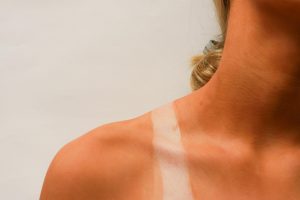But beauty can be a beast
March 27, 2020
The first time, it was just for a special occasion. Then it was every other month. And then it was every week – Spray tanning. When does it stop?
While most white or light- skinned people might use spray tans to avoid looking washed out, there is a new trend in spray tanning to produce much darker skin tones.
In 2018, Swedish company Emmatan came under attack for selling spray-tanning shades called Violet Onyx, DarkAsh Onyx, Carmel, Dark Chocolate and Extreme.
This extreme spray tanning is a form of “blackfishing,” “a recently coined term used to describe someone accused of pretending to be black on social media by using makeup, hair products and in some cases, surgery to drastically change their appearance,”according to British online publisher The Independent.
Aga Brzostowska, a 20-year-old from Poland, became the face of blackfishing in 2018 when she posted a picture of herself at 13. The image was compared to her post on Instagram and highlighted the fact that she’s now darker, with thicker features and fuller lips. Not only had the influencer been applying spray tan but admitted to wearing darker shades of makeup and box braids.
In an interview with BBC, Brzostowska remained unapologetic. “With things like tanning, I don’t think I’ve done anything in a malicious way,” she said. “So I don’t feel like I need to stop doing something because… why would I stop doing something that’s benefiting me or that I enjoy doing?”
While most spray tanning will never approach blackfishing, it can serve as a gateway drug to cultural appropriation.
From the perspective of a person of color, spray tanning can be highly offensive.
Not only does spray tanning disrespect people of color, but not acknowledging the problems behind it shows lack of respect for our struggle.
People of color have dealt with “colorism” since long before spray tanning became possible. According to studentpress.org, colorism is “a system of discrimination in which the degree of lightness in one’s skin is compared to other members within the same racial group.”
Historically the lighter you are the more privilege you receive, especially as a woman. As a whole, America has prioritized lighter women over those of darker skin tones. Actress Lupita Nyong’o, a native of Kenya, has always recognized the differences.
“I definitely grew up feeling uncomfortable with my skin color because I felt like the world around me awarded lighter skin,” Nyong’o said in an interview with BBC. “Race is a very social construct, one that I didn’t have to ascribe to on a daily basis growing up.”
In the 1920s, the Cotton Club used the “Brown Paper Bag Test” to determine who was light enough to perform there. Only those with skin lighter than a paper bag were permitted.
Black women have been described as the most unattractive women in America. Women with big lips, kinky hair, wide noses and dark skin have had to fight for recognition and the right to be considered beautiful.
The problem is that white people can borrow black cul- ture without dealing with the problems that come with it. It calls into question the idea of beauty standards and how is it acceptable for white people to become darker while black people are fighting to become acceptable to society. If we let you have this part of our culture then what is the point of race? When you disregard that this is a problem that comes with tanning then you silence the people who are affected by it.
Spray tans wash off but privilege doesn’t.


